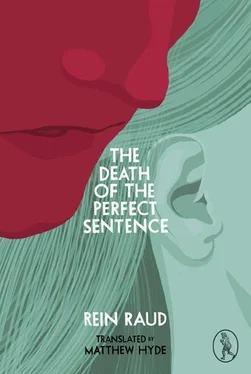And the situation remained the same when she left her position at the school. She used to shrug off any doubts about the nature of her new work; she didn’t have anything to hide. Anyway, the salary was nearly two times bigger, the hours significantly shorter, and she didn’t have to wear a uniform. She quickly got used to leaving gaps in the right places, and she was quite happy that she was not authorised to know what the papers were about. It was other peoples’ business to fill them in.
But sometimes things take many years to reach their culmination, and if the outcome is a good one, then why not be happy?
Raim was in the eleventh grade back then. He was standing in front of the class, and Lidia Petrovna was saying nothing. Strictly speaking, Raim had been caught out, but there was something about him which resembled a budding exhibitionist who was savouring being completely naked for the first time.
Raim was good at drawing, especially pictures of things which were important to him. He’d gone to art class for six years before his father decided that it was better to be good at one thing than mediocre at many, and so Raim had chosen volleyball – there was no other way, he was already captain of the team by then. But of course he kept on doodling away for his own pleasure. And the picture which he had accidently left in between the pages of his Russian exercise book was a really good one. An Art Institute lecturer wouldn’t have expected anything better from one of their student’s life drawings – except this picture was not drawn from real life but from imagination, from desire, from adoration.
Lidia Petrovna was lost for words. She raised her eyes and looked at this boy – to be honest he was virtually a man already – who had seen her like that in his mind’s eye. It was clear that the picture had been drawn from the purest and truest of motivations. Of course she knew where to draw the line of propriety, but she couldn’t restrain a fleeting thought which sent a shudder right through to the tips of her toes.
She knew very well that she would have to handle the situation like a normal person. Not like a teacher. If she wanted to remain a normal person, that is. Because she would still be a teacher whatever she did.
“Sit down,” she said with a slightly hoarse voice, and gave the exercise book back to Raim. That was it. She kept the picture, and never raised the subject again.
But Raim would have been happy to know that the very same evening Lidia Petrovna stood naked in front of her mirror for a while, looking at herself. And for the first time in ages she liked what she saw.
In fact Raim had come to Lidia Petrovna’s block two days earlier, but without going in. He remembered the address from his school days; one evening he’d followed her all the way to her front door, without her even knowing. It was strange, but after all those years he still mentally referred to her by her first name and patronymic, Russian style. He’d just got used to it. Of course the other students had called her Lidia Petrovna too, because that was required as a sign of respect, but when her back was turned everyone knew her simply as Gromova, and that was who she remained, since not a single nickname stuck. Everyone apart from Raim that is, who knew her as Lidia Petrovna, even in his thoughts.
Raim wasn’t sure that his former teacher would still be living there, but Lidia Petrovna was very happy in her small Pelgulinna flat. She had moved there after separating from her husband, part-exchanging it for her three-room Mustamäe apartment, which had left her with enough money to decorate properly and even to buy herself the occasional dress to go to the opera in – so that the men who saw her wouldn’t think she was one of those culture widows. Maybe her new place wasn’t as comfortable as the old one, but she couldn’t stand the sympathetic looks of her husband’s former colleagues who lived in her old block. And she’d got used to the new place by now.
And now, it should be added, she certainly didn’t want to move anywhere else.
Raim had stood on the other side of the street, trying as hard as he could to think up what he would say on the off chance that Lidia Petrovna’s flat was not occupied by new inhabitants who might have her forwarding address. But when Lidia Petrovna appeared at the front door he recognised her straight away. Fortunately she didn’t glance in Raim’s direction but headed straight off towards town. Beautiful, majestic and completely her own woman, just as if all those years had never passed.
“I’ve been living here for ages,” said Lidia Petrovna, “and you only just found me.”
It was actually a question, but Raim didn’t yet know how to answer.
“I still have that drawing of yours somewhere,” Lidia Petrovna said with a grin.
The Lenbumprom delegation travelled back by air, since Gennady Vassilyevich had to be sure to return in time for his son-in-law’s birthday party that evening. As soon as they arrived back at Pulkovo Airport he said goodbye to the rest of the group and headed straight for the VIP channel; if they’d gone by train he would have had to wait with the others while customs went through everyone’s bag. The procedure always took more time coming back from Finland.
Alex collected his small suitcase from the luggage carousel and headed for the customs queue. Unfortunately a large number of passengers from Finnair’s New York flight had transferred on to their flight, and they had trolley-loads of cases and bags with them, so it looked like they had a long wait ahead. Alex was tired and sweaty, and by now the effects of the wine he’d drunk during the pre-departure lunch were starting to wear off, which wasn’t a particularly pleasant sensation. He wasn’t afraid of anything happening at customs, since he had hardly anything of any interest with him apart from a couple of Miles Davis albums. He noted with a sigh that the other queue, which the majority of the Leningrad Paper Industry people had decided to join, was now moving slightly faster, but there was no point in changing queues.
The customs desk gradually got closer and closer, until finally the rather elderly Jewish man who was standing in front of Alex started to lift his cases with New York luggage tags one by one on to the conveyor. First the big ones, then the smaller ones, and then the duty-free carrier bags at the very end. The old man was sweating a lot more than Alex.
There were two customs officials: one to look at the contents of the cases on a screen, the other to rummage about in the cases which had been opened.
“Do you fancy a beer?” the second customs official asked his colleague when the duty-free bag had finally come out of the other end of the X-ray machine. The old man was standing there holding his passport and customs declaration in one hand, and trying to work out whether he was now allowed to put his things back on to the trolley.
“See what he’s got,” the first customs official said, without lifting his gaze from the screen in front of him.
The duty-free bag had come from a shop at Helsinki Airport.
“Nikolay,” the second customs official said, yanking himself a can from the six-pack and opening it.
“Ah, I’m not so keen on Nikolay, it always gives me a headache,” the first one said.
“Excuse me,” the bag’s owner said in Russian which had a heavy Odessa accent, “is bringing beer into the Soviet Union banned now?” He was still holding his passport and the customs declaration in his hand.
“Hey, no one was talking to you,” the second customs official said in his direction, taking a long swig from the can.
“I was just asking,” the old man said in a fluster. “But how about a stamp, do I get a stamp in my papers now?”
Читать дальше












